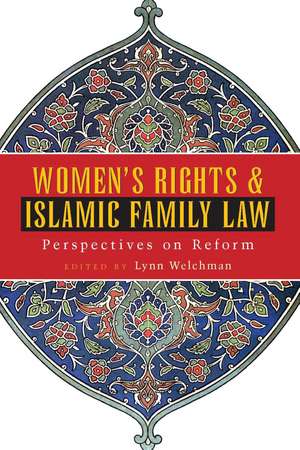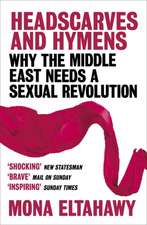Women's Rights and Islamic Family Law: Perspectives on Reform
Editat de Lynn Welchmanen Limba Engleză Paperback – 31 mai 2004
| Toate formatele și edițiile | Preț | Express |
|---|---|---|
| Paperback (1) | 200.71 lei 6-8 săpt. | |
| ZED BOOKS – 31 mai 2004 | 200.71 lei 6-8 săpt. | |
| Hardback (1) | 512.46 lei 6-8 săpt. | |
| ZED BOOKS – 31 mai 2004 | 512.46 lei 6-8 săpt. |
Preț: 200.71 lei
Preț vechi: 231.20 lei
-13% Nou
Puncte Express: 301
Preț estimativ în valută:
38.41€ • 39.80$ • 32.06£
38.41€ • 39.80$ • 32.06£
Carte tipărită la comandă
Livrare economică 22 martie-05 aprilie
Preluare comenzi: 021 569.72.76
Specificații
ISBN-13: 9781842770955
ISBN-10: 1842770950
Pagini: 320
Dimensiuni: 138 x 216 x 18 mm
Greutate: 0.49 kg
Ediția:New.
Editura: ZED BOOKS
Colecția Zed Books
Locul publicării:London, United Kingdom
ISBN-10: 1842770950
Pagini: 320
Dimensiuni: 138 x 216 x 18 mm
Greutate: 0.49 kg
Ediția:New.
Editura: ZED BOOKS
Colecția Zed Books
Locul publicării:London, United Kingdom
Cuprins
Introduction
Lynn Welchman
'Islamic family law' as contested ground
Recurring issues in modern Islamic family law
Historical pluralism and emerging pluralism in Islamic law
Voice and authority in the promulgation and perception of Islamic family law
Registration requirements: room for reform
Bilateral agreements: focussing on the contract
Reform strategies in context
Part I: Muslim Personal Status Law in Egypt: The Current Situation and Possibilities of Reform through Internal Initiatives
Essam Fawzy
1. Introduction
2. Social Context
Introduction
Education
Workforce Participation
Women's Image
Returning to Reality
Domestic Violence against Women
3. Personal Status Law in Egypt: Historical Overview
Between Heritage and Modernisation
Personal Status Law: Residual Sources and Jurisdiction
Regulating the Muslim Family Law in Egypt: The Development of Personal
Law
Problems in Practice
4. Understanding the Law, Egyptian Family and Social Attitudes
The Study
The Sample
Ideal Marriage Age
Right of the Young Woman to Choose her Life Partner
Marriage and Marriage Arrangements
Factors Affecting the Level of Dower
The Purpose of Shabka and Dower
Position on Polygyny
The Husband's Responsibilities
Wife's Work Outside the Home
Physical Punishment of the Wife
Reasons for Divorce
Conclusion
5. Law No.1 of 2000: A New Personal Status Law and a Limited Step on the Path to Reform
Introduction
The Legislative Process
Reaction of the Shari`i Establishment: Scholars and Religious Tendencies
The Parliamentary Debate
Political Parties and the Law
Critical Articles of Law No.1 of 2000 as Promulgated
New Marriage Document
Loopholes in the Law
Results of the Field Survey: The Opinions of the Elite
Results of the Field Study: The Opinions of the General Public
6. General Conclusions
General
Proposals for Development of the Law
Administrative Reforms Proposed by Members of the Judiciary
Recommendations Made by Civil Society Activists
Concluding Comments
Annex: List of Statutes
Part II: Islamic Law and the Transition to Palestinian Statehood: Constraints and Opportunities for Legal Reform
Rema Hammami, Penny Johnson, Fadwa Labadi, and Lynn Welchman
1. Introduction
Penny Johnson and Lynn Welchman
2. Legal Context: Shari`a Courts and Muslim Family Law in the Transitional Period
Lynn Welchmann
Introduction
Shari`a Courts: Jurisdiction and Law
Ages of Marriage and Custody
Post-Divorce Maintenance
Judicial Divorce
The 'Oslo Peace Process': Law and Transition
Shar`i Institutions in the Transitional Period
Shar`i Establishment Positioning on Personal Status Law
Conclusions
3. Palestinian Interim Governance: State Legislation, Legal Reform, and the Shari`a
Penny Johnson
Introduction
Interim Inequalities and Features of the Transition
State Security, 'Re-masculinization,' and Civil Society
Islamist Opposition and Shari`a 'Redlines'
Uneasy Allies: The Authority, Women's Movement and Donors
The Basic Law
Source of Authority, Shari`a, and Legitimacy
4. Attitudes Towards Legal Reform of Personal Status Law in Palestine
Rema Hammami
Introduction
Attitudes Towards Religion
Religious Values and Secular Politics
Support for Women's Rights
Attitudes Towards Shari`a Law
The Shari`a Family Law Survey
Reform of Personal Status Law
Conclusions
5. Agents for Reform: The Women's Movement, Social Politics and Family Law Reform
Penny Johnson
Introduction
Pre-Oslo Agents of Political Mobilization
The Oslo Transition: Advocacy and Protest
The Equality Strategy
The 1994 Women's Charter
The Model Parliament
Maintenance and Inheritance: Conflict Between Rights and Needs?
Strategies in the Model Parliament
Challenging the Parliament's Standing
Islamist Discourses
Human Rights and Western Agendas
Defending the Model Parliament: Defending Democracy or the State?
Final Session: Affirmation of Democracy, Gender Agendas Subsumed
Towards a New Family Law: Developments and Strategies After the Model
Parliament
Divides and Compromises in the Women's Movement
Democratic Families, Democratic Society
Sources and Issues for a New Family Law
Pluralistic Elements of a New Family Law
Conclusions: Strategies and Issues for Action
Annex: Case History: Is a Women Half a Man?: Diya and the Utilization of Principles of Shari`a in Public and Customary Legal Processes for Compensation for Deaths in a Factory Fire in Hebron
Fadwa Labadi
Part III: No Altars: A Survey of Islamic Family Law in the United States
Asifa Quraishi and Najeeba Syeed-Miller
1. Introduction
2. Islamic Family Law in American Muslim Hands
Authority Figures
Intellectual Resources
3. The Muslim Family in the US: Law in Practice
Solemnizing the Union
Terms of the Contract
Within the Marriage
Dissolution of American Muslim Marriage
Deliberately Opting Out of US Default Rules
4. Islamic Family Law in US Courts
Introduction
Validi
Lynn Welchman
'Islamic family law' as contested ground
Recurring issues in modern Islamic family law
Historical pluralism and emerging pluralism in Islamic law
Voice and authority in the promulgation and perception of Islamic family law
Registration requirements: room for reform
Bilateral agreements: focussing on the contract
Reform strategies in context
Part I: Muslim Personal Status Law in Egypt: The Current Situation and Possibilities of Reform through Internal Initiatives
Essam Fawzy
1. Introduction
2. Social Context
Introduction
Education
Workforce Participation
Women's Image
Returning to Reality
Domestic Violence against Women
3. Personal Status Law in Egypt: Historical Overview
Between Heritage and Modernisation
Personal Status Law: Residual Sources and Jurisdiction
Regulating the Muslim Family Law in Egypt: The Development of Personal
Law
Problems in Practice
4. Understanding the Law, Egyptian Family and Social Attitudes
The Study
The Sample
Ideal Marriage Age
Right of the Young Woman to Choose her Life Partner
Marriage and Marriage Arrangements
Factors Affecting the Level of Dower
The Purpose of Shabka and Dower
Position on Polygyny
The Husband's Responsibilities
Wife's Work Outside the Home
Physical Punishment of the Wife
Reasons for Divorce
Conclusion
5. Law No.1 of 2000: A New Personal Status Law and a Limited Step on the Path to Reform
Introduction
The Legislative Process
Reaction of the Shari`i Establishment: Scholars and Religious Tendencies
The Parliamentary Debate
Political Parties and the Law
Critical Articles of Law No.1 of 2000 as Promulgated
New Marriage Document
Loopholes in the Law
Results of the Field Survey: The Opinions of the Elite
Results of the Field Study: The Opinions of the General Public
6. General Conclusions
General
Proposals for Development of the Law
Administrative Reforms Proposed by Members of the Judiciary
Recommendations Made by Civil Society Activists
Concluding Comments
Annex: List of Statutes
Part II: Islamic Law and the Transition to Palestinian Statehood: Constraints and Opportunities for Legal Reform
Rema Hammami, Penny Johnson, Fadwa Labadi, and Lynn Welchman
1. Introduction
Penny Johnson and Lynn Welchman
2. Legal Context: Shari`a Courts and Muslim Family Law in the Transitional Period
Lynn Welchmann
Introduction
Shari`a Courts: Jurisdiction and Law
Ages of Marriage and Custody
Post-Divorce Maintenance
Judicial Divorce
The 'Oslo Peace Process': Law and Transition
Shar`i Institutions in the Transitional Period
Shar`i Establishment Positioning on Personal Status Law
Conclusions
3. Palestinian Interim Governance: State Legislation, Legal Reform, and the Shari`a
Penny Johnson
Introduction
Interim Inequalities and Features of the Transition
State Security, 'Re-masculinization,' and Civil Society
Islamist Opposition and Shari`a 'Redlines'
Uneasy Allies: The Authority, Women's Movement and Donors
The Basic Law
Source of Authority, Shari`a, and Legitimacy
4. Attitudes Towards Legal Reform of Personal Status Law in Palestine
Rema Hammami
Introduction
Attitudes Towards Religion
Religious Values and Secular Politics
Support for Women's Rights
Attitudes Towards Shari`a Law
The Shari`a Family Law Survey
Reform of Personal Status Law
Conclusions
5. Agents for Reform: The Women's Movement, Social Politics and Family Law Reform
Penny Johnson
Introduction
Pre-Oslo Agents of Political Mobilization
The Oslo Transition: Advocacy and Protest
The Equality Strategy
The 1994 Women's Charter
The Model Parliament
Maintenance and Inheritance: Conflict Between Rights and Needs?
Strategies in the Model Parliament
Challenging the Parliament's Standing
Islamist Discourses
Human Rights and Western Agendas
Defending the Model Parliament: Defending Democracy or the State?
Final Session: Affirmation of Democracy, Gender Agendas Subsumed
Towards a New Family Law: Developments and Strategies After the Model
Parliament
Divides and Compromises in the Women's Movement
Democratic Families, Democratic Society
Sources and Issues for a New Family Law
Pluralistic Elements of a New Family Law
Conclusions: Strategies and Issues for Action
Annex: Case History: Is a Women Half a Man?: Diya and the Utilization of Principles of Shari`a in Public and Customary Legal Processes for Compensation for Deaths in a Factory Fire in Hebron
Fadwa Labadi
Part III: No Altars: A Survey of Islamic Family Law in the United States
Asifa Quraishi and Najeeba Syeed-Miller
1. Introduction
2. Islamic Family Law in American Muslim Hands
Authority Figures
Intellectual Resources
3. The Muslim Family in the US: Law in Practice
Solemnizing the Union
Terms of the Contract
Within the Marriage
Dissolution of American Muslim Marriage
Deliberately Opting Out of US Default Rules
4. Islamic Family Law in US Courts
Introduction
Validi










